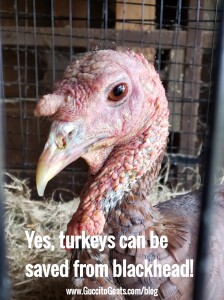
There are tons of websites that will explain what blackhead in turkeys is – and most will tell you it’s fatal and your turkey will die within 3 days with 80-100% death rate. What you need to know is this is caused by a parasite and it is completely preventable and curable, especially if caught early. I’ve added photos below for reference.
Symptoms range and many sites list various symptoms but all have one symptom in common – bright yellow diarrhea. It literally looks like the bright yellow egg yolks from crappy store bought eggs. Sometimes there will be some jet black poop mixed in.
Most likely, if you free range your animals on your property and your turkeys mix with chickens you’ll have to deal with blackhead at some point.
Symptoms I have seen:
- In the earlier stages they drink tons of water
- Despite water consumption the skin on their head can appear very dehydrated (Reference picture below)
- Fever – even by simply feeling their heads you can tell they have fever
- The skin on their heads is very red with little to no blue…soon it will turn purplish without immediate attention…eventually their head can turn blackish (Reference picture below)
- Your turkey isn’t roosting at night or you see it sitting a lot, barely foraging or even “fake” foraging. (Some sites say they stand a lot – I have not found this to be true)
- They aren’t eating and may not be drinking if they are further along
- Some sites say the feathers are ruffled – I have not seen this symptom in mine or others yet.
- In one turkey, his feet and lower legs were turning black, as if he’d stepped into powdered charcoal. I’d never seen this symptom before him but it’s worth noting.
- Biggest sign is the bright yellow diarrhea
Here’s how I’ve saved my own and other farms turkeys (the goal is to expel or kill the parasites and heal the liver and any secondary issues):
- Immediately separate the sick turkey(s) – if you can’t figure out which turkey is sick look at their vents – you can usually see the telltale yellow diarrhea in the feathers surrounding their vent. (Picture below)
- Provide at least a gallon of water – add raw crushed garlic cloves and a tablespoon of cayenne pepper. If you have poultry vitamins you can add to the water, do that as well. Monitor how much the turkey is drinking each day. They won’t drink as much as they feel better.
- Next, mix the following:
- Egg yolk (yolk only)
- 2 to 3 tablespoons warm water
- 1 teaspoon cayenne pepper
- 1 tablespoon Molly’s Herbal Wormer (with wormwood) – or if you have wormwood powder, garlic powder, powdered marigold you can use that as well.
- teaspoon colloidal silver (Formerly I gave shots of Tylan 50 to help with secondary infections but colloidal silver has worked like a charm. Use what you have. The raw garlic in their water will help this as well.)
- I also add a half teaspoon of raw, local honey
- Using a syringe (I use a 3 ml filled to the brim), carefully feed the mixture to your turkey. The first few days you want to get as much into them as possible. I usually have a goal of 3 syringes two or three times a day.
Here are a couple cases that may help you:
Case 1: One year old Royal Palm Hen, Chanel
I came home from a trip one rainy spring and noticed Chanel wasn’t roosting at night. I didn’t think much of it until a couple days later I saw she wasn’t foraging or was fake foraging (acting like she was foraging but wasn’t picking anything up). When I finally noticed the bright yellow diarrhea I knew it was from her and separated her. She was very lightweight, failing quickly and her head was dark and dry. She wasn’t eating or drinking anything. I made the mixture above and she was so weak at this point I could only dribble it into her mouth a small amount at a time. There were many days I thought she was going to die. It took 19 days of separation and watching her go up and down before I was finally convinced she could go out and free range. I let her out and watched her closely. She was fine for a week then I saw her sitting too long again – but she wasn’t having yellow diarrhea. I dosed her again and gave her several Tylan 50 shots over the next few days. Once she looked bright eyed and energetic again I let her out. She ended up laying eggs a couple weeks later and raised two separate sets of poults! She’s still alive and well today. Picture below.
Case 2: One year old Bourbon Red Jake, Rupert (Several pictures below)
Rupert belongs to another farm. They were away on vacation when their farm sitter told them their beloved Jake was ill. They called me to go to their farm to check him out, they suspected blackhead. They were right. I brought Rupert home with me so I could provide constant care, away from my own turkeys.
Unlike Chanel, Rupert had not lost weight and still had strength to drink tremendous amounts of water – spewing watery diarrhea around his crate. I gave him several syringes of the mixture above – and he put up a fight. I had to be very careful of not getting the mixture into his eyes so the cayenne wouldn’t burn him. I was able to wrestle him twice a day to get 2 or 3 syringes into him. By day two his diarrhea changed to green due to the herbs. 7 Days into treatment his poop became solid again and blue color was returning to his head. His skin stopped looking dry. I offered him pumpkin rind (it was fall) with seeds and he ate it voraciously but still didn’t touch his other food. By day 14, exactly, he was back to his old self, pacing his crate, digging around in it and strutting and gobbling for my hens (which annoyed my old tom). He was ready to go back to his family and his own girls.
Advice: Always herbal worm your turkeys, especially during spring and fall and wet times of year. Prevention is better than having to spend the better part of a month nursing your turkey back to health. I recommend Molly’s Herbals dewormer with wormwood – it’s for goats but adding cayenne pepper for your birds gives it an extra boost.
Once you turn your turkey out again, watch them closely for a couple weeks and re-dose if they seem sluggish or aren’t eating well. It takes time for the liver to heal and there could be other issues that developed while their immune system is low.
Reference Photos:
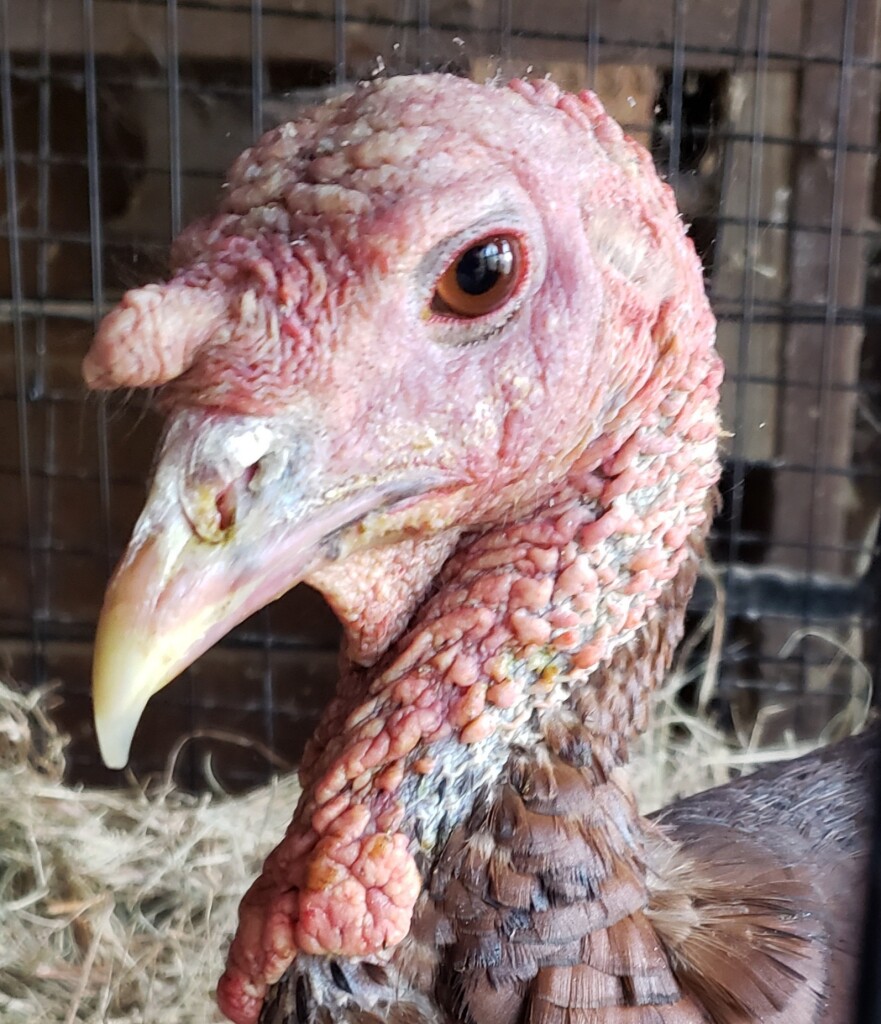
Notice the red, flaky, dehydrated skin, eyes clearly showing signs of not feeling well.
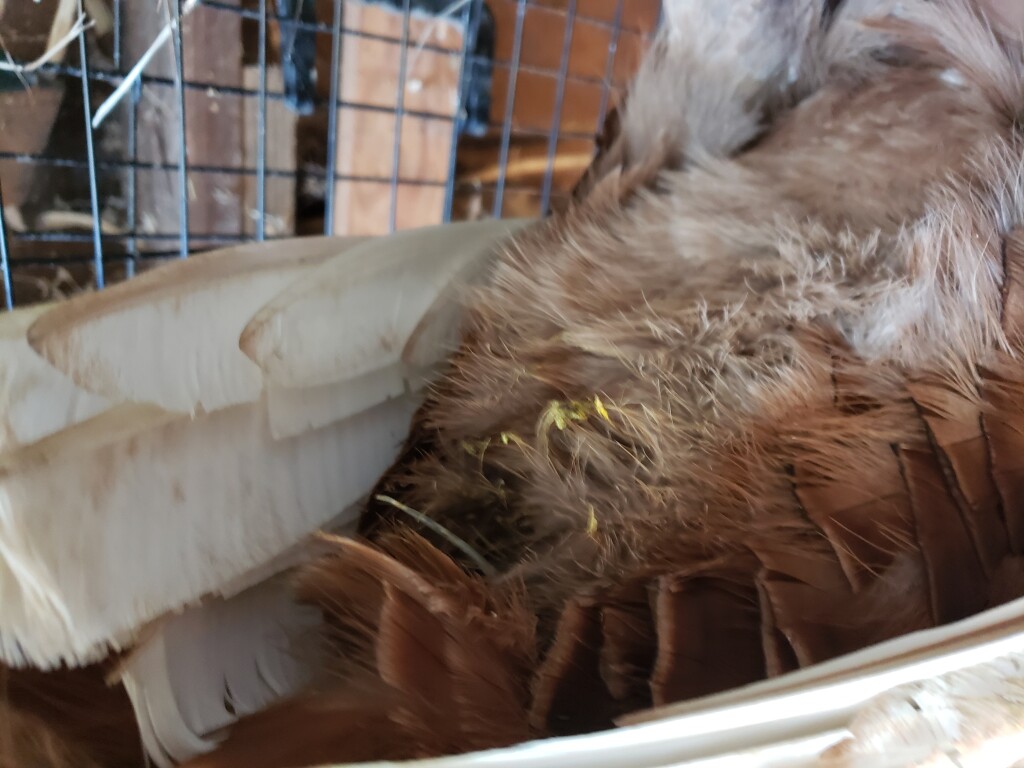
Telltale signs of yellow diarrhea
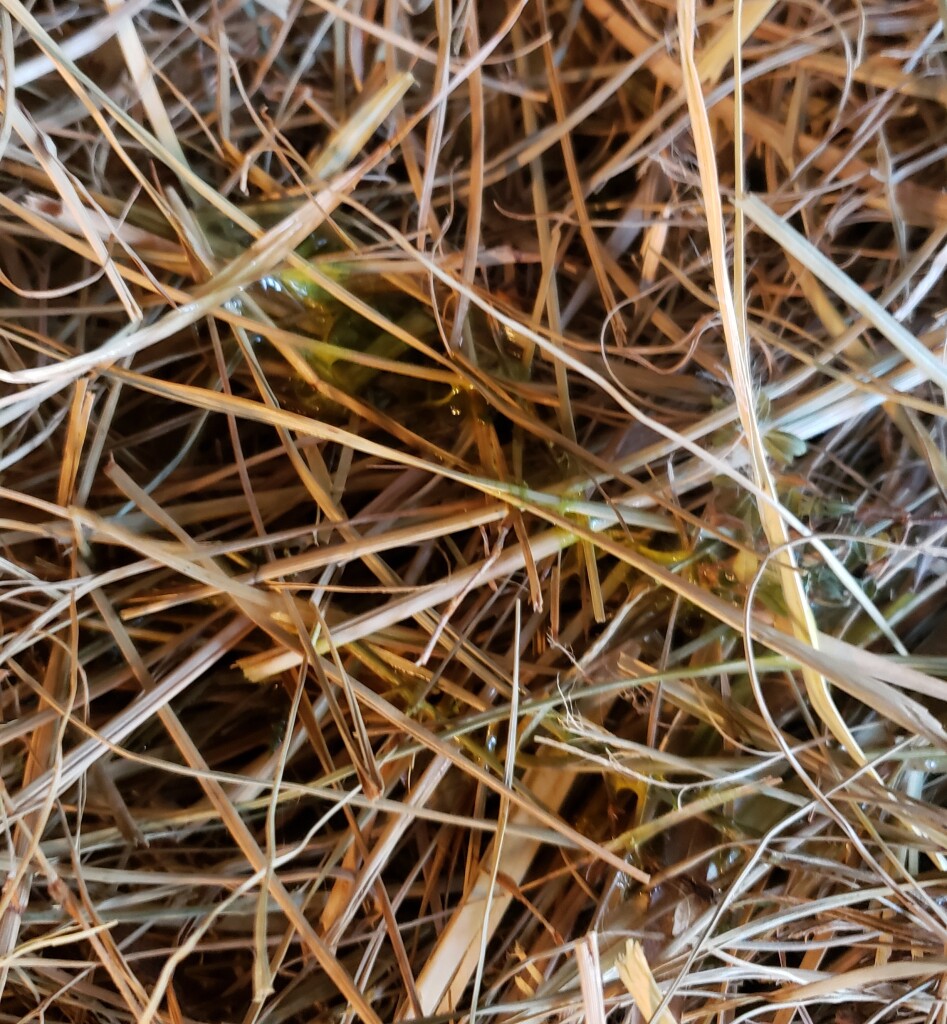
It’s not easy to see due to the hay but you can still see traces of bright yellow diarrhea
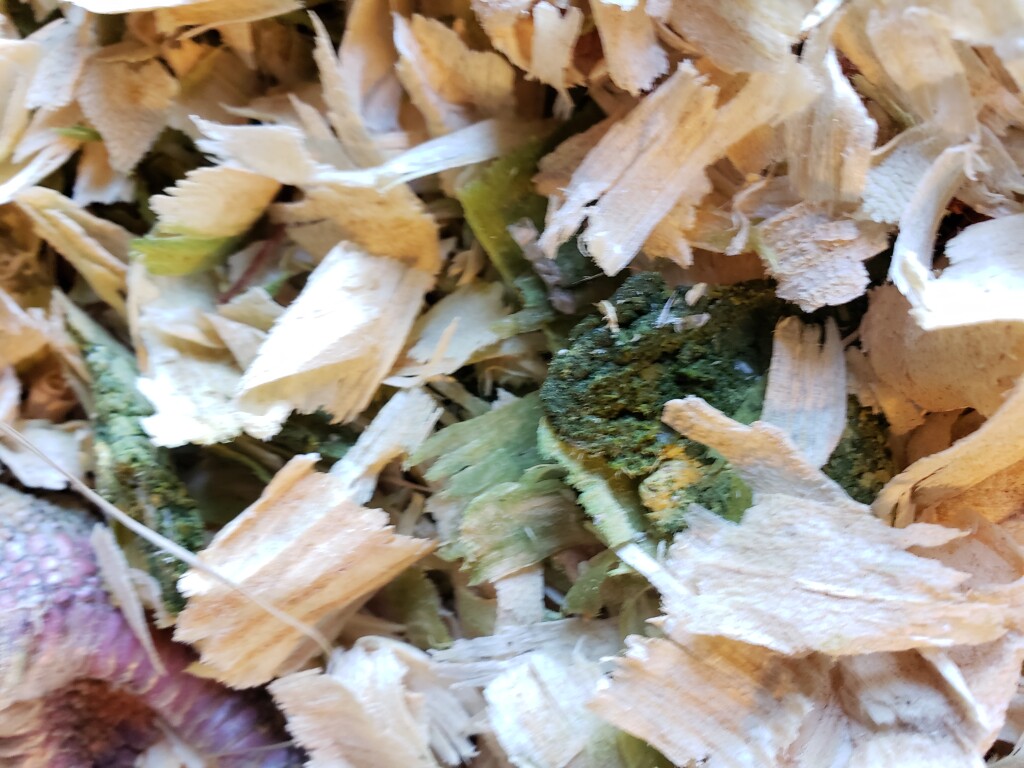
7 Days into treatment the diarrhea has turned green from the herbs and bits of solid feces and white (normal) urine are already developing.
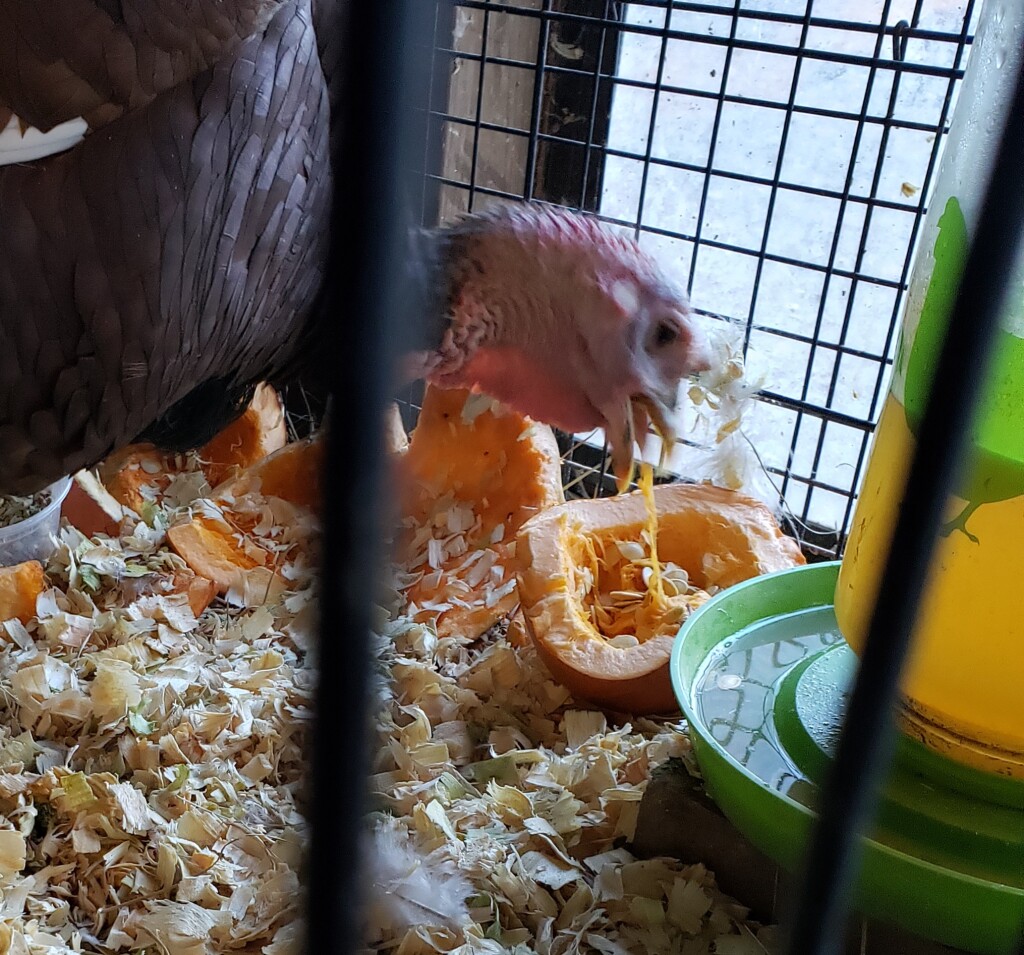
7 days in and he’s eating pumpkin pulp voraciously. You can also see his head is beginning to show blue again. yay!
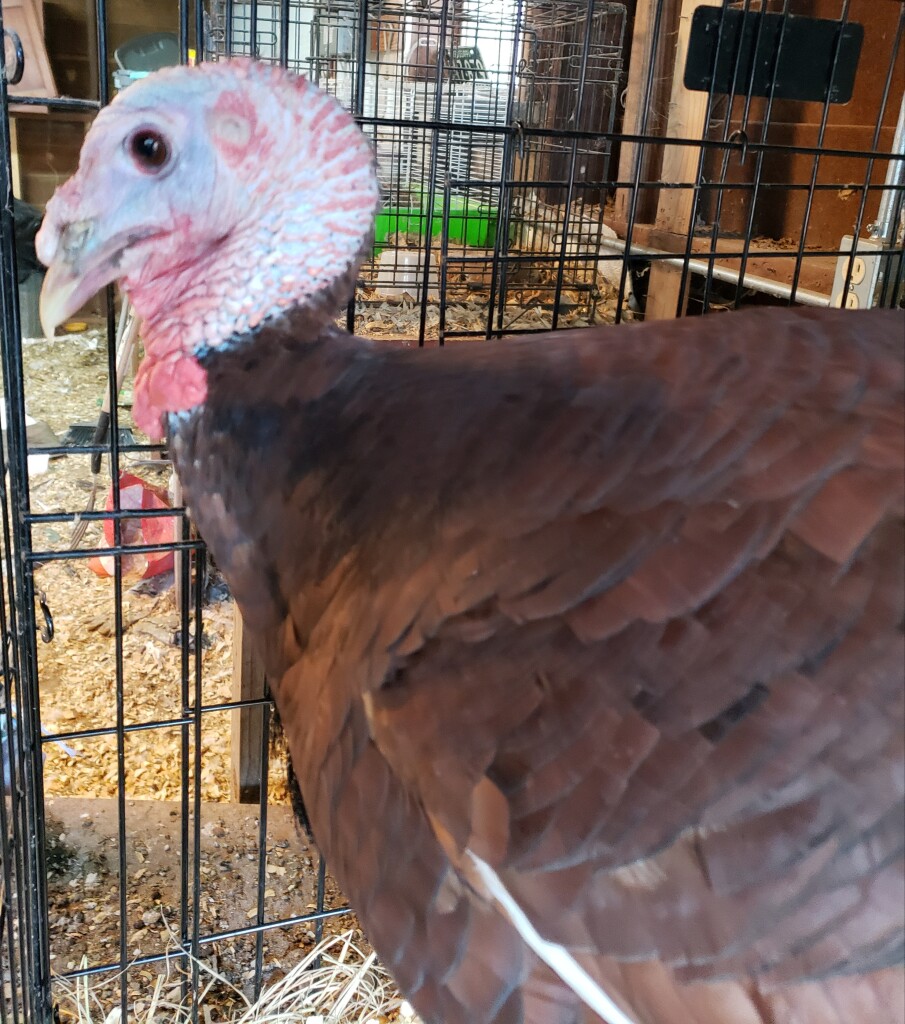
This is 11 days into treatment. You can see how blue his head is and his eyes are looking brighter. He’s showing interest in his surroundings, eating well and chirping at me. He was drinking far less water – which still has raw garlic and cayenne but now I added vitamins and quit other treatment to see if he would stay stable on his own. Which he did. By the next day he was strutting and gobbling loudly at my girls.
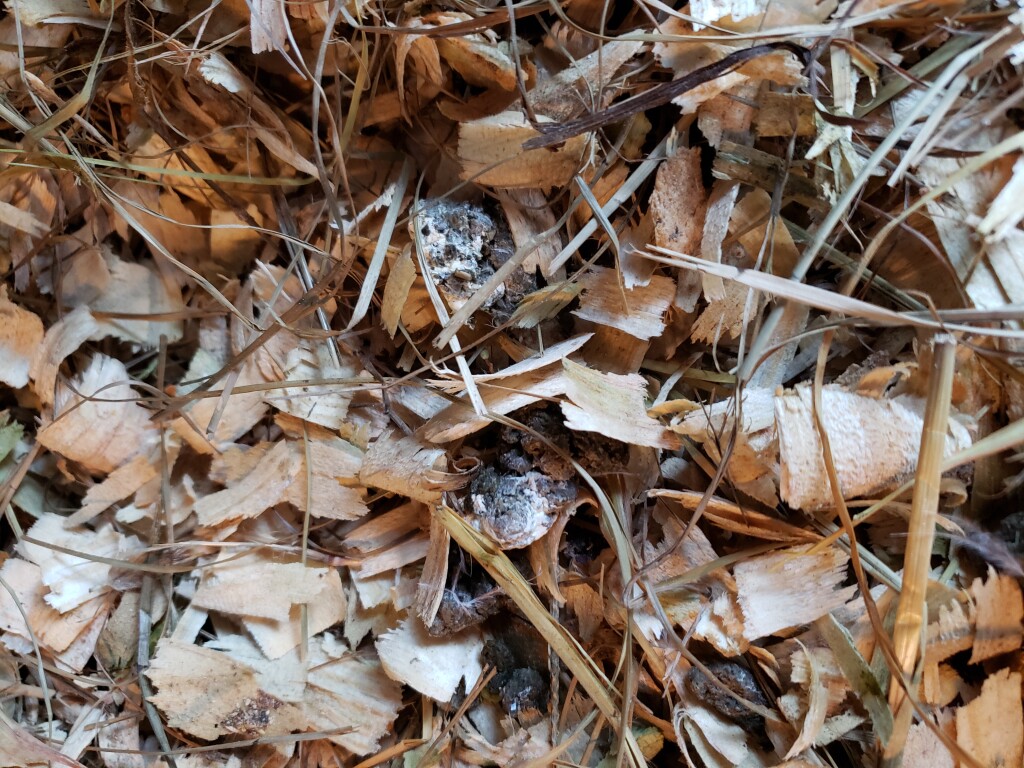
I stopped treatment the previous day so I could really inspect his feces now that he was eating well. All the feces I could find was sparse but normal and zero diarrhea.
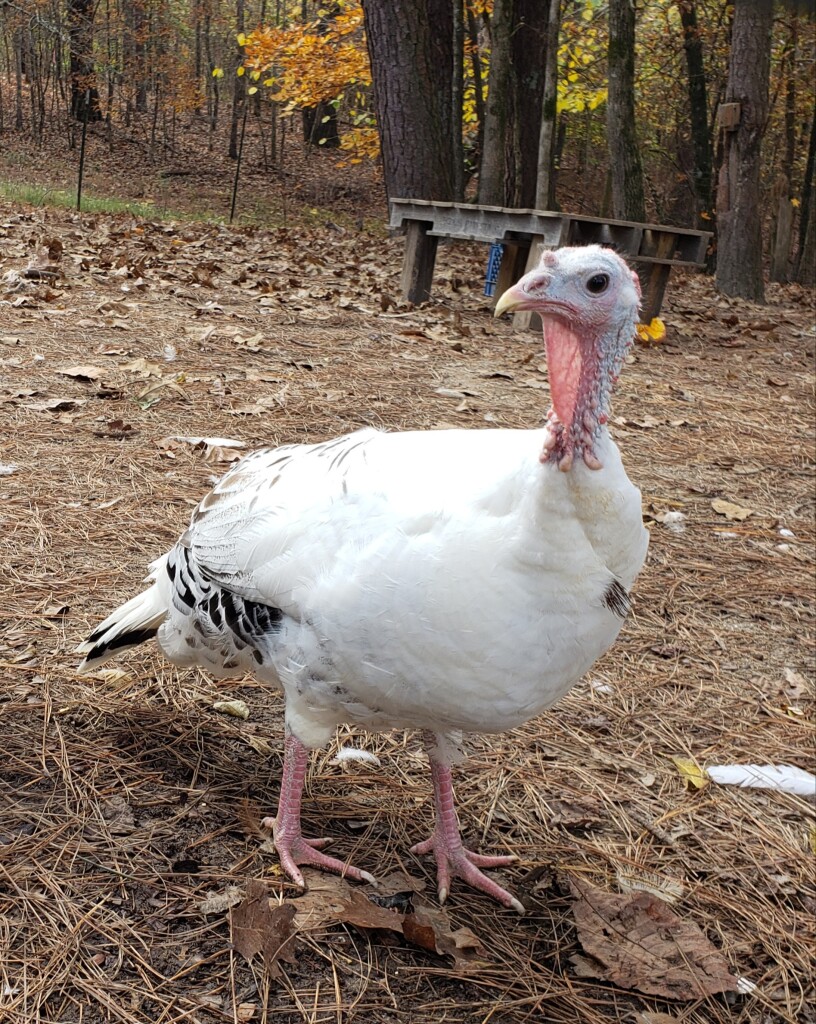
This is my precious Chanel 7 months after beating blackhead and raising her poults.
Feel free to contact me with questions. I hope this post helps someone out there who doesn’t want to give up on their turkey. xo






